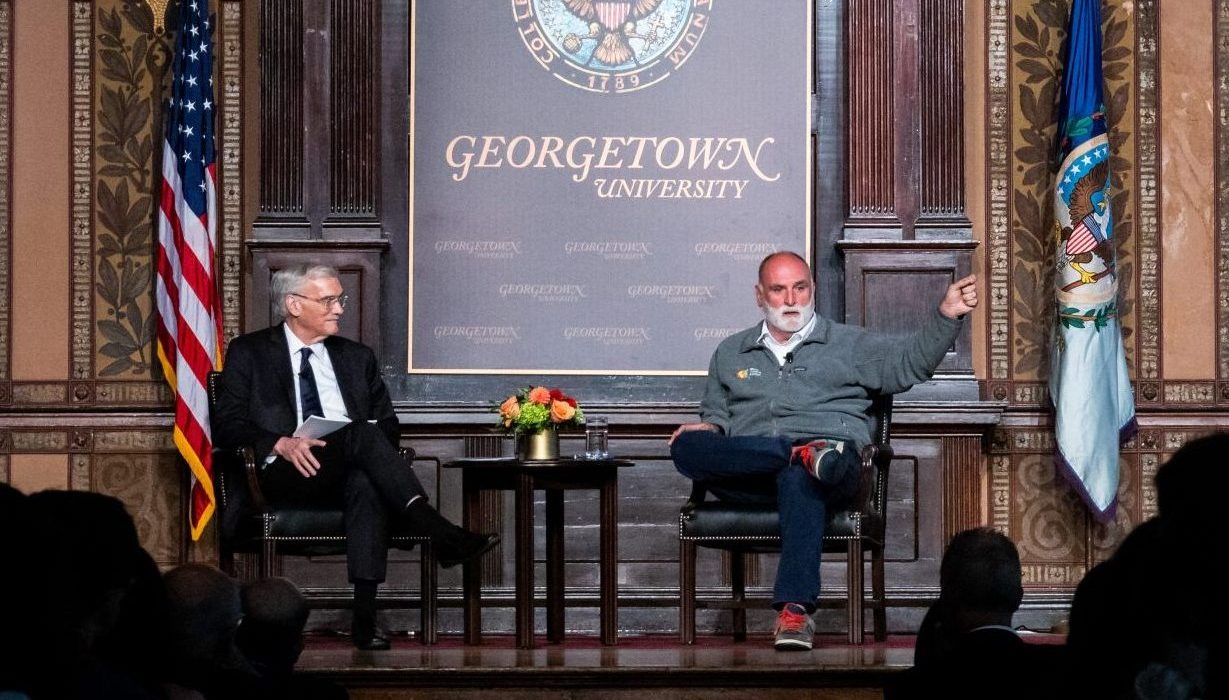José Andrés dished about his career as a “culinary ambassador,” ongoing humanitarian endeavors, and immigration journey at Georgetown’s 2024 Tanous Family Endowed Lecture in Gaston Hall on Oct. 8.
The event was hosted by the university and moderated by Provost Robert Groves. The Tanous Family Endowed Lecture Fund was established by Peter J. Tanous (CAS ’60), annually hosting a distinguished leader to speak to faculty, students, and other community members.
Andrés’s selection as this year’s speaker reflects his over 30-year-long career as a chef, opening his first of 40 restaurants, Jaleo, in 1993. He is the recipient of two Michelin stars for his D.C. restaurant, minibar. Beyond the culinary arts, in 2010, Andrés established the World Central Kitchen (WCK), a non-profit organization that has distributed over 400 million meals to disaster-ridden communities worldwide. He was recognized with an honorary doctorate at the 2019 commencement of Georgetown’s McCourt School of Public Policy.
Groves began the conversation asking what drives the success of WCK. Andrés emphasized the understated importance of food service in supporting those in need.
“Everyone in this audience can feed a few, but if you think about it, that same time can be put to the service of feeding the many,” he said. “What I’ve been learning the last 15 years especially, going from hurricane to fire to a war zone, is if you embrace the complexity of the moment and learn to adapt, every chaos is only an opportunity for you to provide relief efforts. That’s why the Kitchen was created.”
The conversation pivoted to Andrés’s experience as a Spanish immigrant to the United States, arriving on a work visa in 1991 and gaining citizenship in 2013. Andrés described his initial journey to the U.S. by boat, honing in on the wonder he beheld in New York Harbor.
“When I was looking at the American flag next to Lady Liberty, I thought, ‘Look at the beautiful night, the stars, the sky. That night sky in the American flag, all those stars against a dark blue, means you’re free, that if you come [and] work hard, America is welcoming you,’” he said.
Andrés elaborated on his belief in “we the people,” arguing that America is founded on welcoming, accepting, and helping one another through hard times. He emphasized immigrants’ role in this process and denounced the recent spike in anti-immigration rhetoric.
“We need to understand that we have one million DREAMers, young men and women that arrived [in] this country when they were babies, and many more million undocumented immigrants,” Andrés said “Certain people are trying to say that they don’t belong here, that they are rapists, or that they are eating dogs and cats, putting communities in danger. But actually, those communities would not be functioning without them.”
Groves then asked Andrés what he learned through the WCK’s transition from focusing solely on climate disasters to crises like forced migration and poverty. Andrés emphasized the importance of providing people experiencing food insecurity with not just free meals, but also job opportunities.
“Philanthropy needs to change. It seems every day we give more money and have more NGOs, but we also have more poverty and hunger,” Andrés said. “[WCK] has an opportunity for these people. One dollar not only to feed the poor, but also to give opportunity to the homeless and the ex-convicts. One dollar to train them.”
Andrés highlighted the power of food to unite people across borders and opposite sides of a conflict. He compared a meal to a contract, a symbol of the goodness he believes prevails in people over hate.
“In Palestine, women would come to me [and say], ‘What my people did to those children in Israel was wrong, and I wish I could go over there, cook for them and show them we don’t hate.’ In Israel, there were also communities that said, ‘I want to go to Gaza, cook for them and tell them we don’t hate,’” Andrés said. “I sincerely believe that this is the vast majority of us.”
The conversation then shifted again to Andrés’s illustrious career as a restaurateur and, prospectively, the owner of a hotel in Georgetown set to open in 2027. Andrés discussed his beginnings in the food industry.
“I had the dream of opening a Spanish restaurant in Disney. Why? Because when I visited Disney almost 30 years ago, there was no Spanish restaurant. Almost 30 years later, I opened the biggest Spanish restaurant in the world in Disney,” Andrés said. “It was [about] having missions to set for myself.”
Groves then invited student questions. One asked about the biggest obstacle the WCK faces and how the organization tackles them. Andrés responded that emergency humanitarian responses can fall short, but collaboration can strengthen their impact.
“When you work with the mindset that in an emergency, everything belongs to you, and then you put those assets at the service of helping people, that changes everything dramatically,” Andrés said.
Finally, Andrés took a student question asking what advice he would give to his 23-year-old self, freshly on U.S. soil. He offered up an answer right away: don’t be “grumpy.”
“Life is a fascinating learning experience. I would tell that 23-year-old to listen, to embrace the gift that life is, to be surrounded by people who all make you better every day,” Andrés said. “Smile at everybody that comes to you. Don’t waste a second to make everybody else around you better.”







